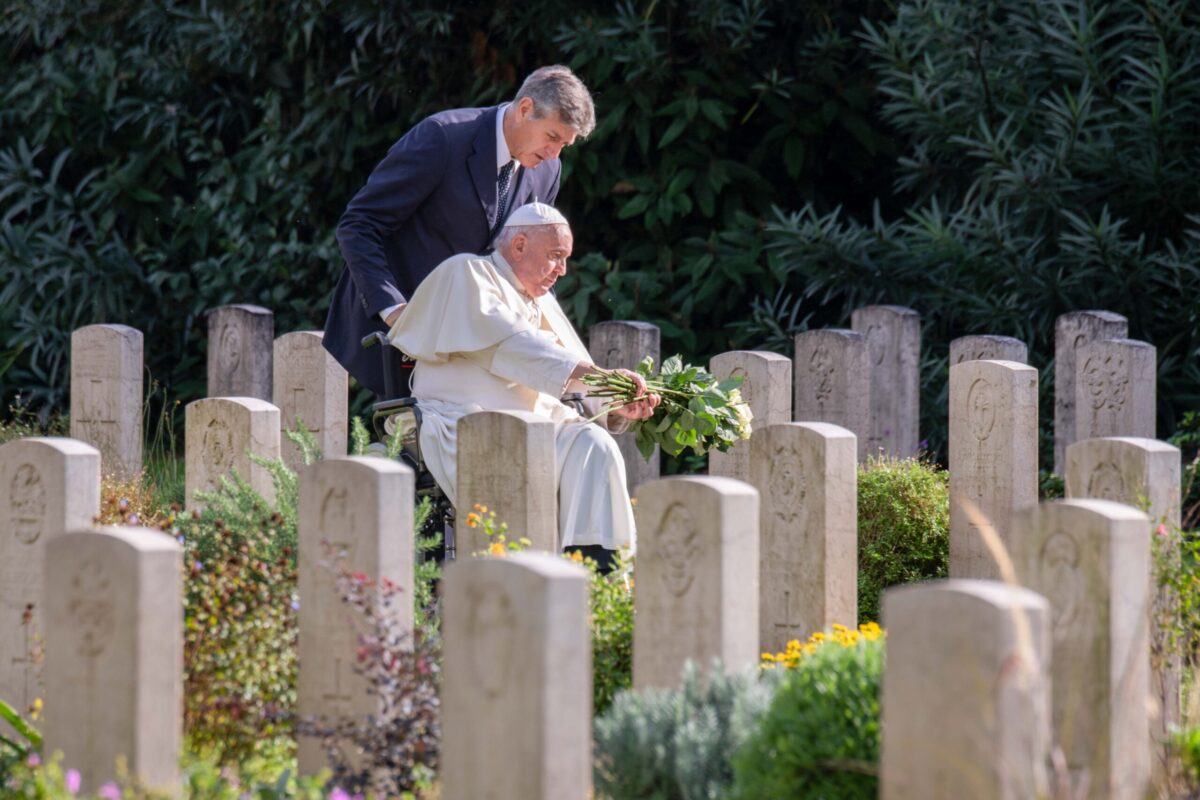By Carol Glatz
ROME (CNS) — As the sun broke through the morning sky after a torrential downpour in Rome, Pope Francis was wheeled past dozens of gravestones that marked the final resting place of members of the military forces who died during and immediately after World War II.
He carried a bouquet of large white roses and had an aide place it at the grave of Guardsman William Perkins, a member of the Welsh Guards who died at the age of 28 in 1944. The pope then continued along the green lawn, hands clasped briefly in prayer.
“So many innocent dead, so many soldiers who leave their lives there,” the pope said later in his homily at Mass celebrated Nov. 2 at the Rome War Cemetery, the burial place of members of the military forces of the Commonwealth.
“But why?” the pope asked in his unscripted homily. “Wars are always a defeat, always. There is no total victory, no. Yes, one wins over the other, but behind it there is always the defeat of the price paid.”
Looking at the ages of those buried, the pope said he saw that “most of them were between 20 and 30 years old. Lives cut short, lives without a future here.”
“I thought about the parents, the mothers who received that letter, ‘Ma’am, I have the honor to tell you that your son is a hero.’ ‘Yes, a hero, but they took him away from me,'” he said, imagining the conversation. “So many tears in those lives cut short.”
The same thing is still happening today in wars, he said. “So many dead! Life is destroyed without realizing this.”
“We ask the Lord for peace, so that people will no longer kill each other in wars,” he said.
Marking the feast of All Souls brings to mind the importance of remembrance and of hope, he said.
It is a day to remember all those who have lived and died, he said. There are those who did good with their life, with their families and friends, and also “those who failed to do so much good, but they were received in God’s remembrance, in God’s mercy. It is the mystery of the Lord’s great mercy.”
Remembrance is also part of hope, he said, because it helps people look at the path they are taking and look ahead toward that final encounter “with the Lord and with everyone.”
“We pray to the Lord for our dead, for all, for everyone: that the Lord will receive them all. And we also pray that the Lord will have mercy on us and give us hope: hope that we can go forward and find them all together with him when he calls us,” the pope said.
About 300 people were present at the outdoor Mass, including families, members of the military and local authorities, including Rome’s mayor, Roberto Gualtieri.
More than 420 men, who came from the United Kingdom, Australia, Canada, India, New Zealand and South Africa, are buried at the Rome War Cemetery. They died between November 1942 and February 1947.
After the Mass, Pope Francis also made a brief stop in front of the city’s Non-Catholic Cemetery.
The cemetery dates back to at least 1716, when records show that Pope Clement XI permitted members of the Stuart Court in exile from England to be buried in front of the huge ancient Roman pyramid tomb of Caius Cestius. It has been a resting place mostly for non-Catholic foreigners.







